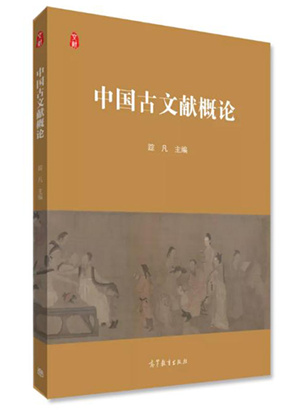
. > WHAT'S NEW > BOOKS
An introduction to classical philology
Author : HOU WENXUE Source : Chinese Social Sciences Today 2022-02-16

An Outline of Chinese Classical Philology
Chinese classical philology is a discipline that centers on the generation, accumulation, external form, and basic constitution of Chinese classical documents, encompassing the compilation and research methods of classical documents. The discipline shoulders the important task of inheriting ancient civilization and carrying forward traditional culture.
An Outline of Chinese Classical Philology, edited by Zong Fan, a professor from the School of Literature at Capital Normal University, attaches great importance to the basic classics in ancient China [in accordance with the traditional four-branch classification], including jing [Confucian classics], shi [history], zi [philosophy], and ji [literature].
At the same time, the book gives an account of leishu [reference books], congshu [anthologies], excavated documents, and Dunhuang literature, while discussing the methods of retrieving, utilizing, and researching classical documents. It aims to improve the knowledge structure of undergraduates, making up for deficiencies in the teaching content of ancient Chinese literature and ancient Chinese language courses.
The aforementioned fourfold classification method, which originated in the Western Jin Dynasty (265–316), has a long history, is widely accepted by scholars, and still vivid as of today. The fourfold classics almost cover the whole content of ancient Chinese culture.
As such, the book puts a large chunk of focus on these classics. First of all, it concentrates on the Confucian “thirteen classics” and related literature of Confucian classics studies. Second, it introduces the major types of historical records and significant history works. Third, it presents the development and evolution of works of ancient philosophers, and introduces classic works in the category. Then, the book informs readers of literature relating to zongji [anthology of multiple authors’ works] and bieji [anthology of an individual author’s works], as well as literary and poetic review.
The book gives respective attention to major classics. In terms of Confucian classics, it highlights Book of Changes, Book of Documents, Classic of Poetry, Records of Rites, The Commentary of Zuo, and Erya [an early Chinese lexicon].
Regarding history, it emphasizes the The Records of the Grand Historian, History of the Former Han Dynasty, Comprehensive Mirror for Aid in Government, and Records of the Western Regions of the Great Tang Dynasty.
As for the category of philosophy, the book introduces Tao-te Ching, Zhuangzi, Whole Book on Agricultural Activities, Classic of Tea, and Compendium of Materia Medica.
In the field of literature, it emphatically introduces Words of the Chu, Complete Tang Poems, and Literary Mind and Carving of Dragons.
Beyond this, the book provides information on anthologies, reference books, unearthed documents, and the Dunhuang documents, which are effective supplements to the four-branch classics.
Hou Wenxue is a professor from the College of the Humanities at Jilin University.
Ye Shengtao made Chinese fairy tales from a wilderness
Ye Shengtao (1894–1988) created the first collection of fairy tales in the history of Chinese children’s literature...
-
How northern ethnicities integrated into Chinese nation
2023-09-18
-
Mogao caves
2023-09-12
-
Mogao Grottoes as ‘a place of pilgrimage’
2023-09-12
-
Time-honored architectural traditions in China
2023-08-29
-
Disentangling the civilizational evolution of China
2023-08-28
-
AI ethics in science fiction
2023-08-23













 2011-2013 by www.cssn.cn. All Rights Reserved
2011-2013 by www.cssn.cn. All Rights Reserved